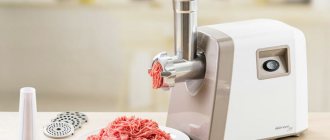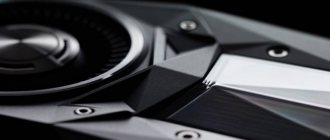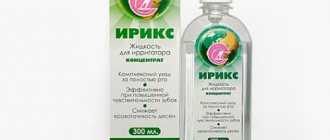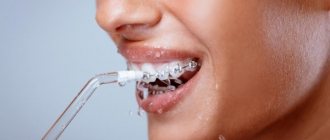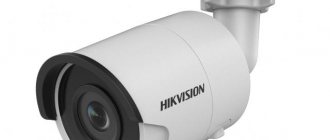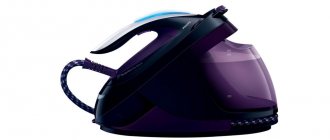Irrigators are devices that help maintain oral hygiene and clean teeth from plaque and food debris. They make it very easy to care for crowns, braces and dentures. Not everyone knows how to select such devices correctly. Let's list the selection criteria and make a rating of the best irrigators.
Irrigators work on the following principle: a device inside the device delivers a pulsating stream of water or other liquid under pressure into a special tube. By targeting the teeth with this jet, plaque and food debris are removed. The gums are also massaged using an irrigator.
In this article
- Purpose of the irrigator
- Who should not use an irrigator
- Types of irrigators: which one is better
- Types of irrigators according to operating principle
- Features of pulsed oral irrigators
- Microbubble oral irrigator
- The best irrigators - what are they?
- Good irrigators of 2021
- Rating of good portable irrigators
Various types of these devices are produced, which differ in several indicators: power, number of pulsations per minute, functionality, etc. Let's look at these nuances. Let's find out what criteria should be taken into account when purchasing and list the top 10 oral irrigators, which are recommended by doctors and are in demand among customers of our online store.
Purpose of the irrigator
Before listing the best oral irrigators, let’s talk about the overall benefits of this device. It allows:
- Achieve gentle cleaning of gums and teeth from plaque and food, and in hard-to-reach places.
- Perform a gum massage that stimulates blood circulation and increases tissue regeneration.
- Effectively cleanse the tongue of bacteria, relieving the oral cavity of unpleasant odor.
- Prevent the development of caries, periodontitis, stomatitis and other pathologies of the teeth, gums and oral mucosa.
- Care for braces, implants, dentures and crowns that cannot be fully cleaned with a brush, floss or mouthwash.
However, it should be understood that a waterpik is not an alternative to a toothbrush. Cleaning teeth with a jet of water is carried out after standard hygiene procedures.
Such a device will be useful to everyone, even if there are no dental problems. Plaque accumulates over the years, causing it to have to be removed at the dentist's office. Using an irrigator prevents the accumulation of tartar, which in the long run allows you to save on expensive procedures. But this device is especially useful for smokers, people with weak immunity, a predisposition to caries, pregnant women and those who have braces.
Who should not use an irrigator
There are few contraindications to its use. The irrigator cannot be used during periods of exacerbation of chronic dental diseases, in the presence of inflammation in the oral cavity and during infectious diseases. You should also use the device with caution if you have increased gum sensitivity and thinning tooth enamel. In such cases, it is necessary to select appropriate types of irrigators. Overall these devices are safe. They are suitable for all people, including children. However, before purchasing, it is advisable to visit a dentist so that he can rule out contraindications.
Which brand of irrigator is better to choose?
Many companies produce good irrigators, but experts named only five brands as the best on the market:
- Philips. The global manufacturer of various home appliances pleases users with the most modern technologies, the best quality and unique design. The products are more expensive than some analogues, but they are durable and highly reliable.
- Donfeel. The Russian company is the undisputed leader in the market. The brand produces a wide range of irrigators of various designs, with a good combination of decent quality and reasonable price. An important advantage of the company is customer care, which is expressed in high-quality technical support and honest work of service centers.
- WaterPik. The company is popular for its long history, rich professional experience and proven technologies. All the details and functions of the devices are thought out, the quality is confirmed by numerous reviews, and the external design “keeps pace with the times.” The list of advantages is complemented by a wide selection of irrigators for every buyer.
- Panasonic. The company produces household appliances, including technologically advanced and reliable irrigators for home use. Japanese quality is visible not only in durability, but also in every detail: clear buttons, smooth operation, precise joining of body elements. According to reviews, the devices are worth the money, despite their high cost.
- Revyline. The brand is included in most ratings and reviews, because it produces good dental devices that meet the requirements of modern users. The company develops all types of devices: portable, stationary, flow-through.
Types of irrigators: which one is better
Which irrigator is better to buy? Many models are available with different functional characteristics. Each of them has its own advantages and disadvantages. The two main types are stationary and portable irrigators. The first ones (Waterpik WP-660 Aquarius, B.Well WI - 922) operate on mains power, they are large in size and are not intended for frequent transportation. Such devices differ in power, the size of the liquid reservoir, the length of the cord, the presence or absence of fasteners for placement on the wall, etc.
Portable irrigators (MED-2000 RUS model: AG-708, Waterpik WF-02) are very compact, so they can be taken on a trip. They work on batteries that are charged from the network or wirelessly - it all depends on the specific model. The volume of the reservoir is much smaller than that of a stationary device, but it is enough for complete cleaning. A portable device is less powerful, but you can take it with you on a trip. It costs a little more than a stationary one.
There are also simpler devices that do not have a motor that creates water pressure. They are a tube with a nozzle that connects directly to the water tap. With this irrigator, you can only use plain water for cleaning. There is only one operating mode without the ability to adjust the jet pressure.
Which irrigator is better - portable or stationary - depends on personal preference.
For a family, it is more profitable to purchase a large device with many attachments. A travel irrigator is more suitable for a person who often travels on business.
Types of irrigators
Despite the fact that all irrigators solve the same problem, they have different design principles and are created for different conditions of use. All models of irrigators are divided into four groups, which have different types of energy sources.
- Stationary irrigators. Installed in the bathroom, they require an electrical network to operate. They are distinguished by a reliable design, a large fluid reservoir and a powerful motor capable of creating a high level of fluid pressure.
- Portable irrigators. Rechargeable batteries or rechargeable batteries are used to power the power part of the device. They are convenient for business trips and travel. Many modern models are not inferior in their technical characteristics to stationary ones.
- Flow irrigators. They are installed on a water tap and use the pressure of the water supply system. They do not require electricity to operate. The tap valves regulate the fluid pressure.
- Mechanical irrigators. These are portable devices in which the pressure required to form a jet is achieved through mechanical action on the piston. There is a button or key on the body of the device that must be squeezed with your hand to create the required pressure.
Irrigator jet types
Different models of irrigators can produce different types of working jet.
- Monojet. It is a continuous thin stream of liquid under constant pressure. This technology is gradually becoming obsolete and is being replaced by more advanced technologies.
- Pulsating jet, turbo flow. A stream of liquid comes out of the irrigator nozzle, creating micro hydro-impacts that effectively remove plaque and clean all hard-to-reach places in the oral cavity.
Main technical characteristics
The technical capabilities of irrigators are the most important characteristics that affect productivity, efficiency and cost.
- Water jet power. Using this indicator, you can fairly objectively assess the capabilities of the device. As a rule, this figure is higher for expensive models. Stationary models tend to have a higher jet power than portable ones. Although there are exceptions - the portable Revyline RL 400 develops pressure up to 820 kPa, which is higher than many stationary models. The power (pressure) of the irrigator jet is measured in kiloPascals (kPa). The vast majority of models have power adjustment, which allows you to select the liquid pressure individually.
- Jet pulsation. Most modern irrigator models use a pulsating type of working jet. The optimal frequency that ensures effective and comfortable cleansing is 1,200 pulsations per minute. There are models with higher jet pulsation (1700 and higher).
- Tank volume. As a rule, one complete brushing of teeth requires 150-200 ml of water. The volume of the tank, even in portable models, allows such cleaning to be carried out without additional filling of water. Stationary models have much larger tanks (from 0.5 l). This volume is sufficient for several procedures.
- Number of modes. The ability to change the operating mode and fluid flow pressure level significantly expands the capabilities of the device and allows you to select the necessary parameters.
Types of replaceable nozzles
For most modern models of irrigators, replaceable nozzles have been developed that can be used to solve various hygiene problems.
- Standard nozzle. Used for regular cleaning of the oral cavity.
- Periodontal attachment. Designed for cleaning gingival (periodontal) pockets.
- Tongue cleaner. Removes plaque from the tongue and freshens breath.
- Orthodontic attachment. Used to care for braces and other orthodontic structures. Maintains the cleanliness of system components and parts, extends their service life.
- Brush attachment. Cleans teeth like a classic toothbrush and massages gums.
- Teeth whitening attachment. Used for whitening and polishing enamel.
- Nozzle for rinsing the nasopharynx. A special nozzle for irrigation and cleaning of the nasal cavity.
An overview of the most popular models of irrigators can be found in our material “Rating of irrigators 2021”. For those who have decided to buy an irrigator, we recommend our article “Which irrigator is better to choose.”
Oleg Ilyashenko
Features of pulsed oral irrigators
The pulse device operates on the basis of water hammer, creating a pulsation of water. The number of pulses exceeds more than 1200 per minute. Dentists recommend such devices to patients with a tendency to gingivitis and periodontal diseases. The irrigator effectively removes fresh and old plaque, massages tissues without causing discomfort even with increased sensitivity of teeth and gums. The only disadvantage of this device is the need to change attachments frequently.
Examples of good pulse irrigators are Revyline RL 100, B.Well WI - 922 and Waterpik WP-660 Aquarius.
Microbubble oral irrigator
Irrigators that work on the principle of filling a pulsating jet with small air bubbles are considered by dentists to be the most effective. The water-air flow removes food debris between teeth well, removes plaque and has an antibacterial effect. Also, such devices are used for rinsing the nasal cavity during the treatment of sinusitis and for the prevention of this and other diseases. The downside is the relatively high price compared to other types of devices.
Good microbubble irrigators: Waterpik WP-100 E2 Ultra, Oral-B OxyJet MD20, Donfeel OR-830.
As for multi-jet models, they are connected directly to the tap. Such devices are considered outdated and least effective. It is better to purchase microbubble or pulse. There is a large selection of irrigators, so you can find a multifunctional device at a reasonable price.
The best microbubble irrigators
The multi-bubble water supply system in irrigators is highly efficient. The devices help not only clean all interdental spaces, but also remove harmful bacteria. This is important for the prevention of periodontitis, gingivitis, and caries. And also for treating gum disease at an early stage at home, and at an advanced stage - on the recommendation of a doctor.
During the supply process, water is actively saturated with air microbubbles, which ensures better purification. Today, hygienists and periodontologists believe that this technology is the most universal and effective. Such devices are suitable for any purpose: daily maintenance of oral hygiene, care of implants, crowns, removable and non-removable orthodontic structures.
Panasonic EW1211A
The compact irrigator with microbubble technology operates in three modes: Jet (removes plaque and food debris between teeth), Regular AirIn (provides a light massage of the gums), SoftAirIn (for a comprehensive massage of the entire oral cavity). The device comes with two rotating attachments. The irrigator is powered by a battery, so it is convenient to use it at home or take it with you on a trip or business trip. According to customer reviews, the model is very comfortable in the hands; the rubberized waterproof body provides a secure grip and easy control. Among the disadvantages is a small water tank.
Advantages:
- three jet modes;
- high power for a portable model;
- efficiency of use;
- practical and reliable;
- reasonable cost;
- Suitable for cleaning braces, crowns, implants.
Flaws:
- there is no charging indicator;
- small capacity compartment for water.
2. Philips Sonicare AirFloss Pro/Ultra HX8424/32
This model is a complete dental center for the oral cavity. The set includes a three-mode irrigator with Microburst microbubble water supply technology and an electric toothbrush. The irrigator performs three functions: massage, cleaning and whitening teeth. Additionally, there is a spray mode, which makes the device universal. According to reviews, the device will completely eliminate the need to buy dental floss and toothpicks, because it effectively cleans the interdental space of any food debris. Owners also noticed an improvement in the condition of their gums and a reduction in plaque. At the same time, the irrigator is convenient - water is supplied exactly in the direction, there are no unnecessary splashes, and the device is comfortable to hold in your hands.
Advantages:
- 3 modes and spray function;
- good power;
- well-developed ergonomics;
- compactness;
- battery life about 3 weeks.
Flaws:
- high price.
Donfeel OR-830
An excellent stationary irrigator is suitable for preventative teeth cleaning and preventing the development of gum disease. A special feature of this model is a built-in UV lamp for disinfection of nozzles. As well as an increased capacity for aqueous/medicinal solution. Thanks to the configuration, the irrigator is suitable for braces, cleaning implants, crowns, and bridges. The device operates in 10 modes with smooth adjustment. For a stationary model, the OR-830 is compact, but, according to reviews, you need to allocate a separate place for it. Among the shortcomings, users noted a short power cord, but its length is 1.4 m. There are also fakes on the market, but they are easy to distinguish by the absence of a seal on the case.
Advantages:
- 1 liter tank;
- UV lamp for disinfection;
- easy to use;
- build quality;
- 7 different attachments;
- high jet power.
Flaws:
- there are fakes.
The best irrigators - what are they?
The main factors to consider when purchasing a irrigator are medical conditions, personal preferences and financial capabilities. Also, the criteria for selection may be the technical parameters of the devices:
- Construction type. A stationary device is inconvenient to transport. It is best to attach it to the wall in the bathroom next to the mirror and sink. If you often have to be away from home or go on business trips, then purchase portable devices.
- Jet pressure. Irrigators with pressure regulation are more expensive. They are advised to buy them for people who already have dental problems: plaque, caries, bleeding gums. For example, with sore gums, you can reduce the pressure so that there is no further injury to them.
- Operating mode. For some diseases it is necessary to use a specific regimen. However, the more functions an irrigator has, the more expensive it is.
- Power. Portable models are usually less powerful than stationary ones. But a good irrigator, regardless of its type, should be more powerful than 250 kPa.
- Number of pulsations per minute. The average frequency is 1200.
- Liquid reservoir size. Stationary devices are equipped with containers from 600 ml, and portable ones - from 120 ml. The large tank is designed for several people, and the small one is enough for one cleaning.
- Period of continuous operation. Appliances that operate on mains power usually have a timer that turns off the device after a certain period of time to prevent it from burning out. Portable ones operate on batteries that hold a charge for several hours.
- Number of nozzles. They can also be purchased separately. Usually the kit includes a standard one and several special ones: orthodontic, for the tongue, etc. The more attachments, the more expensive the product.
- Appearance. This parameter is important for portable models. You can purchase not only a functional, but also a stylish irrigator.
Now let’s present the best irrigators from specific manufacturers.
WaterPik WP-450 Cordless Plus
The unique portable (travel) irrigator Waterpik WP 450 Cordless Plus E2 is a true embodiment of two undeniable advantages - compactness and functionality.
Ideal for both home use and long trips . Portable dimensions and the ability to work for a long time on a single battery charge make the presented model the optimal solution in cases where there is simply no direct access to a 220 V network. Powerful - up to 1450 pulsations per minute , with the ability to select water pressure depending on the need and how sensitive the teeth and gums are.
, both ordinary water from a filter and special liquids can be used , which makes such a device not only universal, but also truly effective. Removing plaque and freshness of breath, gentle massage of the gums to strengthen them - this is exactly what the presented model is capable of. An important feature is that this device is suitable for cleaning dentures, braces and bridges.
Pros:
- Type: irrigator.
- Water pressure is 207–517 kPa.
- There is a reservoir with a capacity of 210 ml for liquid.
- Performs 1200 impulses per minute.
- Operating modes – “Powerful” and “Gentle”.
- 1 nozzle, which is designed for jet cleaning.
- 1 nozzle specifically for cleaning the tongue.
- An orthodontic nozzle that is designed to rinse the areas directly around braces and fillings.
- Plaque Seeker attachment, which is intended for crowns, bridges and implants.
- Charges from a built-in battery.
- The reservoir is consumed in 45 seconds; m
- 210 ml reservoir for approximately 45 seconds of operation.
- 1200 pulsations per minute.
- The battery charge lasts for about a week.
- The principle of operation is pulsed.
- Jet mode.
- Stepwise adjustment of jet pressure.
Minuses:
- Absent: Connection to water supply.
- Spray mode.
- Contactless charging.
- Nasal nozzle.
- Brush attachment.
- Periodontal attachment (for gums).
- Container for nozzles.
- Automatic shutdown.
- Bracket.
Review and brief instructions for the irrigator:
Good irrigators of 2021
Popular stationary irrigators that are in demand in 2021 include the following models:
- Waterpik WP-100 E2 Ultra is a powerful device with a large set of nozzles, strong water supply and ten operating modes. Tank volume - 0.65 l, cord length - 1.3 m, pulsation intensity - 1400 per minute.
- Oral-b OxyJet MD20 is a microbubble device with a frequency of 1350 pulsations and continuous operation for 15 minutes. The liquid capacity is 0.6 l, the wire length is 1.3 m. The set of nozzles is designed for four family members.
- Aquajet LD-A8 is an irrigator with rubberized elements that repel water. Sold with 5 attachments and a wall hanging bracket. Continuous operation time - 10 minutes, reservoir - 500 ml, frequency - 1200.
- Aquapick AQ-300 is a device that produces 1800 pulsations per minute. Available with attachments for the whole family and four colored brackets. Capacity volume: 600 ml. There are individual cases for each attachment.
- B.Well WI - 922 (white) - high power irrigator (more than 800 kPa) with five types of nozzles, the tips of which are equipped with anti-slip rubber suction cups. Pulsation intensity - 1850, reservoir - 0.6 l.
All presented irrigators operate from the mains (220V).
WaterPik WP-300 Traveler
A stationary traveler - the Waterpik WP 300 E2 irrigator; its body is distinguished by a pleasant design and compactness with a spacious irrigator. That's why it's called Waterpik WP 300 traveler.
Waterpik 300 irrigator stimulates blood circulation and massages the gums, which makes it possible to maintain oral health.
The universal adapter is applicable for various electrical networks , which allows you to use the Waterpick 300 irrigator in any country in the world - wherever you go, you can take the device with you everywhere.
the Waterpik 300 irrigator is on average 50% smaller than the dimensions of other stationary models. This convenient device will not take up much space in your travel bag, and will also fit perfectly into any, even small-sized bathroom.
The low noise level of Waterpik 300 makes brushing your teeth more enjoyable, as evidenced by numerous positive reviews. If we compare this device with other models of the company, the Waterpick Traveler is the quietest.
The Waterpik 300 irrigator has a convenient long cord that will reach the farthest outlet, as well as a universal adapter.
Pros:
- 1,200 pulsations per minute.
- Compact design for small bathrooms.
- 2 times smaller than other stationary models.
- Ideal for travel - folds into a compact bag.
- Works in any country in the world - has an adapter for different electrical networks.
- Quiet and powerful.
- 3 levels of water pressure.
- Power supply: 220 V.
- Water pressure: 70-550 kPa.
- Water tank: 450 ml.
- 4 attachments: standard, orthodontic, for cleaning implants, for cleaning tongue.
- Adapter for socket.
- Case for transportation and storage.
- The principle of operation is pulsed.
- Jet mode.
- Stepwise adjustment of jet pressure.
- Container for nozzles.
Minuses:
- Absent: Connection to water supply.
- Spray mode.
- Contactless charging.
- Nasal nozzle.
- Brush attachment.
- Periodontal attachment (for gums).
- Automatic shutdown.
- Bracket.
Video review of this irrigator in the video below:
Rating of good portable irrigators
Rated portable irrigators are:
- Revyline RL 200 XL is a pulse device that operates in three modes. The set includes 2 standard nozzles for blast cleaning. The pulse frequency is 1400. The device is charged via USB.
- B.Well WI-912 is a device that operates in three modes, one of which is intended for people with sensitive teeth. This irrigator can provide a healing gum massage. Frequency - 1420, 5 attachments included.
- Panasonic EW-DJ 1 - microbubble irrigator with a power of 530 kPa, suitable for gentle care of sensitive teeth, frequency - 1200.
- Donfeel OR-888 is a compact device that can be folded (13 cm when folded). Waterproof, frequency - 1200, 2 nozzles.
- Philips Sonicare AirFloss Ultra HX8432/03 is the most advanced type of pulse irrigator. Can deliver single, double and triple stream. It is possible to charge from Philips Sonicare toothbrushes.
You will find these and other irrigators for cleaning the oral cavity in our online store.

